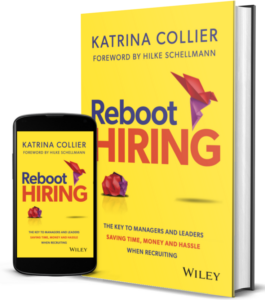Recruiter ghosting is (finally) having its comeuppance
In my opinion:
- Recruiter ghosting: happens when HR, in-house or external recruiters cease responding to candidates, applicants, interviewees, and especially those who are unsuccessful. Even though they carry a communication device on them 24/7 they 👻
- Company ghosting: there is no such thing! People work in companies. People create damaging things like ‘no-feedback policies’. And the people involved in hiring stop responding, not the bricks and mortar.
- Hiring manager ghosting: in my opinion, this is the source of much of the problem because potentially you cannot get the feedback to give the feedback. Both in-house and agency recruiters are often blamed for hiring manager ghosting but they can stop this.
- Candidate ghosting: when someone who has chosen to spend their valuable time talking to you or your client/company about a role disappears… 👻
The impact of candidate ghosting on recruiters
I recently asked recruiters how they FEEL when candidates vaporise and they said:
Nothing. Curious. Confused. Motivated. Disappointed. Relief. Resigned. Annoyance. Irritated. Solicitude. Perplexed. Reflective. Non-plussed. Acceptance.
And I also hear of indignation, but this isn’t the 90s. The Internet has empowered people. It shows them all the jobs and all the reviews. It means they are easy for others to find and contact. So if they are interviewing, they likely have many things on the go.
They don’t owe anyone an explanation. Though it seems wrong or unfair. This is their livelihood, their career, and many factors will be at play. But mostly, candidates don’t fear the repercussions of ghosting as people did in the past. And sometimes, sadly, they simply don’t respect the recruitment profession enough to reply and explain.
But those words above show that their ghosting has little emotional impact on recruiters.
The impact of recruiter ghosting on candidates
Earlier this week, I presented a Masterclass on preventing ghosting for The FIRM, and Neil Armstrong from Tribepad, presented some startling stats from their #EndGhosting report.
86% of ghosted applicants are left feeling down or depressed. 43% of ghosted applicants take several weeks or even months to move on from the experience.
Depressed: in a state of unhappiness or despondency. Unhappy & without hope
How different an emotion to those listed by recruiters. Down or depressed.
But if that doesn’t get you, 94% of ghosted applicants retain negative thoughts or feelings towards the employer brand. And they talk… and that makes it even harder to recruit.
LET’S STOP IT! 👏
As a profession, it’s time we accepted that we did indeed start it. Let’s drop the blame game and move on. No side should ghost but for the greater good, let’s take control.
Ghosting was certainly happening in the 70s, I vividly recall several instances where I’d call to follow up on an interview only to be told, “Oh, we filled that position.” I guess rejection letters were too much of an effort. @Kixco3
1. Get your company or agency committed
No, not that kind of committed! 😆 Committed to The Circle Back Initiative or #EndGhosting campaign. 💪🏻
2. Learn how to deliver bad news
We are recruiters, and the vast majority of what we do is reject people, so face it head on. If you haven’t got budget for training, I’m reading Nonviolent Communication at the moment and it’s fascinating. Or you could try Fire Well by Sue Ingram (and definitely give out copies of it to your managers).
3. Nip this in the bud during the Intake strategy session
Gain the commitment from your hiring managers to give feedback on every single interviewed applicant (minimum). For tips on doing this, refer to Chapter 5 of The Robot-Proof Recruiter, and be sure to read the last 2 editions of this series.
4. Ditch no-feedback policies!
Leaving people down or depressed because your company is scared it will be sued is, frankly, disgusting. People can learn to deliver bad news in such a way that your company won’t be sued but if your leaders won’t listen… get talking about the cost of 💩 candidate experience on the bottom line.
In the words of my father, upon reading the introduction to my book:
“It reminds me of the time I was Office Manager. It was 1965, and we all needed to employ clerks. There was no shortage of applicants. Indeed, I had about 40 ladies* applying for one vacancy. Tip Top was smart enough to coach us in how to handle the situation. “Remember, every applicant is a potential customer for our product, therefore be courteous to all applicants, even to the point of apologising to each that there were many applicants for the one vacancy.” It seemed very good advice.”
On top of the immediate cost of annoyed people no longer purchasing your company’s products and services, what is the cost to the business of empty seats and undelivered projects?
5. If they still won’t budge
You could resign and find a company closer aligned to your values. Rumour has it, recruiters are currently unicorns so go for it. 🦄
Or call me in. I will get your leadership team onboard, through hard facts and a workshop, sprinkled with Aussie frankness. Because a damaged employer brand and a poor candidate experience can not be ignored in this market.
Originally posted on LinkedIn as part of the Recruitment Isn’t Broken newsletter.

